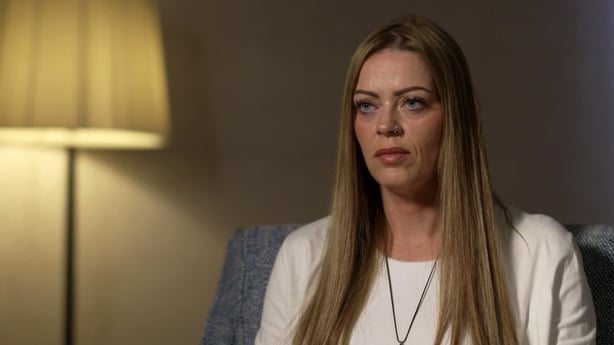Figures supplied by the Dublin Rape Crisis Centre to Prime Time show that all 31 clients they supported through the court system last year had their cases adjourned at least once.
The vast majority of the adjournments, 84%, were for six months or more.
Rape Crisis Centre CEO Noeline Blackwell says delays within the court systems are causing further unnecessary stress for victims of sexual assault, rape, and domestic violence.
She has called for reform of the operation of the criminal courts system, to mirror changes made in the commercial courts in recent years.
"If you can do it for money [matters], you can surely do it for criminal matters," she said.
Karen Stanley was raped in a Dublin hotel in 2013. Her case took six years to go through the courts.
"The waiting, the waiting is just too much. It was too much, way too much. This should have been dealt with within the first 24 months," she said, speaking to Prime Time.
"Then I could have dealt with that and continued with my life."
Her case was first listed for trial in 2018, five years after the attack. It was adjourned, finally being heard in late 2019.
In March 2020 her attacker, UK resident Hoi Ping Yung, was sentenced to four-and-a-half years imprisonment.
He was released from prison last month.
"When something bad happens, we process it, we heal it, and we move. I couldn't process, heal, move anything, because it wasn't dealt with," she said.

Ms Blackwell says better case management within the courts system would make a significant difference to victims.
"Remember that we are talking here about a victim of sexual abuse. Somebody who's gearing themselves up to tell something to a court full of people that they don't know, and that they'll never meet again."
"And then they are all set to do that, and somebody doesn't turn up. A barrister is missing, the judge is delayed somewhere, and you're sent away for how long?"
"This is just cruel to victims of sexual violence," she said.
Some judges in the criminal courts are already using pre-trial hearings to iron out technical or procedural issues, but not all.
Pre-trial hearings can help prevent applications to introduce extra evidence at later stages in proceedings, which are a common cause of adjournments.
In Ms Stanley's case, once the man who raped her was brought to trial, she had to take the stand.
"Mentally, it is draining. I was three days on the stand and it wiped me. It absolutely wiped me," she said.
"My only focus in that time for the duration of the trial was to be authentic, tell the truth."
The trial took such a psychological toll that she blames it for the loss of her successful business.
"The court consumed everything and I didn't have the capacity mentally, emotionally, to continue with the business. I absolutely couldn't."
Ms Stanley praises the Dublin Rape Crisis Centre for helping her. She acknowledges the courtesy and kindness shown by members of An Garda Siochána and those she dealt with in the office of the Director of Public Prosecutions.
But, she says, the legal process was slow and traumatic.
"Something needs to change as regards our systems," she said.
The Dublin Rape Crisis Centre operates a national 24-hour helpline for victims of rape, sexual assault, sexual harassment or childhood sexual abuse: 1800 77 88 88
A special report, 'Justice Delayed', broadcasts on Prime Time on Thursday 25 May.






